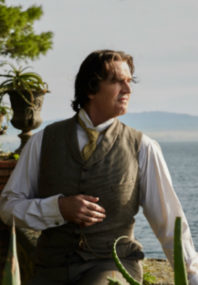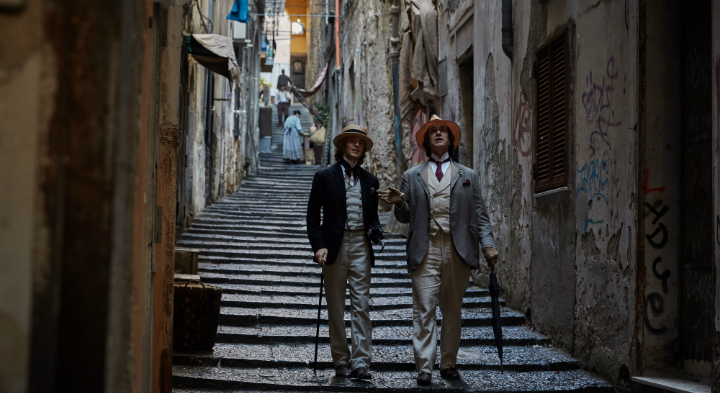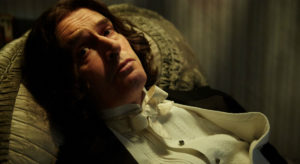
During the height of his fame, acclaimed writer Oscar Wilde (Rupert Everett) was the United Kingdom’s most famous celebrity, but the adoration ended once his sexual proclivities came to light. Wilde faced more than public shaming. Government officials deemed his crime, sodomy, too objectionable name, and sentenced him to two years of hard labour. Writer/director, Rupert Everett’s The Happy Prince, picks up in France after Wilde’s release and follows him throughout his final days.
Homeless and destitute, a rudderless Wilde finds solace in drinking too much and having sex with handsome younger men. Though his life is in shambles, he finds relief in the company he keeps and by using his razor-sharp mind to steal away moments of joy, even during the shittiest circumstances. He’s accompanied by the object of his affection (and his downfall), Alfred “Bosie” Douglas (Colin Morgan), and the duo travel across Europe with little financial means but sustained by each other’s company.
Wilde lived a fascinating, though, tumultuous life, but we remember him for his unrivalled talent. The man had a way with words like no other. There are few people with personalities so magnetic they could make something as drab as reading insurance forms an experience worth remembering. Oscar Wilde is one of the few. Many of the film’s best moments are just listening to how words elegantly glide off his tongue.
Everett’s performance captures crucial aspects of Wilde’s personality: wit, charisma, and audaciousness. You can envision flocks of people circling around him, hanging on his every word – he’s the person you go out of your way to sit next to at a dinner party. The Happy Prince nails both sides of the man; his larger than life personality and dazzling eloquence as well as his world-weary soul.
The Happy Prince isn’t a plot-heavy film, and the story doesn’t build to a crescendo. Instead, we watch a man well-past his rise to fame and fall from grace, as his life gently peters out. This tale is told through nuanced performances, emotional subtext, and not-so-subtle themes. Some films get their message across by spelling everything out with voiceover and on-the-nose dialogue, but that’s approaching a story with a blunt force instrument. With talented lead actors like Everett and Morgan and this excellent veteran cast, you tell your tale with surgical precision.
Colin Firth, Emily Watson, and Tom Wilkinson don’t receive much screen time, but they leave their marks on the story. Watson, who plays Wilde’s beleaguered wife, makes the audience feel her pent-up years of frustration. Wilkinson brings a wild energy in his performance as a priest brought in to read Wilde his last rites. And Morgan stands out as Wilde’s travelling companion. His character, Bosie, represents the fickle nature of fame and desire, the traits that brought Wilde’s career to a tragic end. Morgan excels at conveying this duality, he is a raging fire of indulgence, indiscretion, and resentment.
Cinematographer John Conroy and production designer Brian Morris have teamed up and created an impressive vision of 19th century Europe. Wilde’s tour through France is a sight to behold. Gaslit streetlights cast soft golden hazes down upon cobblestone streets. Wilde’s trips down winding narrow roads flanked by snow-capped rooftops look straight out of a Dickens novel. And outside of the city, Conroy captures the cascade of pinks, oranges, and golds beaming down from a picturesque sunrise, beautiful enough to screen cap and hang on a wall. I do have a minor complaint. Sometimes the ornate set dressing feels a bit too staged and showy, reinforcing the fact you’re watching a movie. It’s a small gripe, but no less of a distraction.
The Happy Prince isn’t an exciting or upbeat film; it’s slack in places, uses a dreary colour palette, and tells a tragic story. Factor in the elite British thespians, sad violin music, and heavy-handed moments, and this picture becomes the thirstiest type of Oscar-bait. But this film works because of Everett’s exceptional lead performance. He finds the perfect balance between the larger-than-life figure and the vulnerable human being. It’s a performance filled with pathos and soulful radiance that stays with you after the movie ends. This role probably won’t land him an Oscar-nod, but it deserves a spot in the conversation.
Many biopics focus on their protagonist’s crowning achievement and the struggles and perseverance that forged their legacy. Instead, The Happy Prince shows Wilde’s life and career as it circles the drain of irrelevance. The film touches on the gruelling demands of fame, wealth, and notoriety while highlighting the transient natures of joy and contentment. Despite the public shaming, impoverished final years, and death at 46, Wilde’s legacy lives on. The message here is that finding pleasure and satisfaction in life doesn’t require praise and riches. The Happy Prince says that love, friendship, and strength of character are the only currencies that matter in life’s fickle economy.
- Release Date: 10/19/2018



